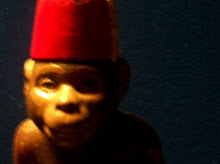Brooks describing what he calls "neural Buddhism," or the result of the "cognitive revolution":
First, the self is not a fixed entity but a dynamic process of relationships. Second, underneath the patina of different religions, people around the world have common moral intuitions. Third, people are equipped to experience the sacred, to have moments of elevated experience when they transcend boundaries and overflow with love. Fourth, God can best be conceived as the nature one experiences at those moments, the unknowable total of all there is.He gets the first part, concerning the self, right from a Buddhist perspective. The rest is a bit more speculative. He places all this in the context of the recent jabber about atheism:
In their arguments with Christopher Hitchens and Richard Dawkins, the faithful have been defending the existence of God. That was the easy debate. The real challenge is going to come from people who feel the existence of the sacred, but who think that particular religions are just cultural artifacts built on top of universal human traits. It’s going to come from scientists whose beliefs overlap a bit with Buddhism.To some extent this sounds like the logical conclusion of the now cliched "I'm not religious I'm spiritual" mantra that one hears so often these days. But that mostly represents a tepid apathy, whereas Brooks, I think, may be getting at something a bit more profound. Maybe.
In unexpected ways, science and mysticism are joining hands and reinforcing each other. That’s bound to lead to new movements that emphasize self-transcendence but put little stock in divine law or revelation. Orthodox believers are going to have to defend particular doctrines and particular biblical teachings. They’re going to have to defend the idea of a personal God, and explain why specific theologies are true guides for behavior day to day. I’m not qualified to take sides, believe me. I’m just trying to anticipate which way the debate is headed. We’re in the middle of a scientific revolution. It’s going to have big cultural effects.
Maybe something like this from theoretical biologist Stuart Kaufmann:
So the unfolding of the universe - biotic, and perhaps abiotic too - appears to be partially beyond natural law. In its place is a ceaseless creativity, with no supernatural creator. If, as a result of this creativity, we cannot know what will happen, then reason, the Enlightenment's highest human virtue, is an insufficient guide to living our lives. We must use reason, emotion, intuition, all that our evolution has brought us. But that means understanding our full humanity: we need Einstein and Shakespeare in the same room.This is sort of interesting. Kind of a reinvigorated (or maybe just rehashed depending on your perspective) pantheism. You have to read the whole article to see how the biology informs it, but I can see how this holds some appeal. As a crusty old agnostic I have some vestigial God habits and I sometimes entertain the idea of undertaking a Jamesian sort of experiment and deciding that I will believe. But I quickly realize that while I can say quite clearly what I know I cannot believe, I cannot really say what I would believe were I to decide to believe. I can't go in for all the particulars that Brooks talks about, all the theological specifics that make a religion a religion. But something like Kaufmann is proposing, well, I guess it's vague enough, but shit, I don't know, yeah it is awe inspiring and stunning and beautiful and horrifying all at the same time, but...oy. Without a religion would that make me spiritual? Poor tricky can't abide that thought.
Shall we use the "God" word? We do not have to, yet it is still our most powerful invented symbol. Our sense of God has evolved from Yahweh in the desert some 4500 years ago, a jealous, law-giving warrior God, to the God of love that Jesus taught. How many versions have people worshipped in the past 100,000 years?
Yet what is more awesome: to believe that God created everything in six days, or to believe that the biosphere came into being on its own, with no creator, and partially lawlessly? I find the latter proposition so stunning, so worthy of awe and respect, that I am happy to accept this natural creativity in the universe as a reinvention of "God". From it, we can build a sense of the sacred that encompasses all life and the planet itself. From it, we can change our value system across the globe and try, together, to ease the fears of religious fundamentalists with a safe, sacred space we can share.


